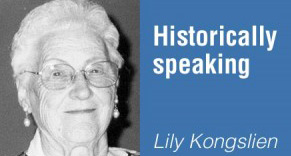
Tenacity and a strong spirit helped to survive the Great Depression
By Lily Kongslien
Special to the Star Journal
I was quite young when I began to notice my parents struggle to make a living from day to day. I was told that in the mid-twenties my father was interested in raising and breeding silver foxes (and history now tells me that that was an era of many folk turning to raising mink and silver foxes, and that the climate in northern Wisconsin was perfect for such a venture). My father worked at the Carroll fox farm in Lake Tomahawk Township, just north of McNaughton, and there he learned first-hand the intricacies of the daily care and the breeding of the animals to produce silvery pelts which were in great demand at that time in history in the large cities, such as New York. Then he bought ten pair of silver foxes and started his own business, which meant constructing the pens, complete with nesting boxes in each pen.
As the years went by he would add to the number of foxes, keeping in mind the need for good animals that would produce good and valuable pelts. I grew up in my early childhood helping in the fox yard; although I quickly found out that foxes, even the pups, did not become pets. After several successful years the depression loomed in the distance and we had a hard time buying the necessary food for them, and for ourselves and he knew that, even though he hated to admit it, he could see no other way but to pelt all of them and get them to the market. Where he once got $500 for a beautiful silvered fur, he now was lucky to get perhaps $25. I remember the sadness in his face as he packed and sent his last shipment of furs to the dealers in New York. Then came the final job of taking down the pens, salvaging the boards and the wire and nesting boxes that were bought by a fox rancher in the Wausau area who had a much bigger operation and did not feel the depression as we did. But through it all my father tried to be cheerful, taking any job available for a few dollars a day.
We continued to survive through those days of the Great Depression, however, as did all the rural families. The Civilian Conservation Corps was begun by President Franklin Roosevelt in 1933 and in 1935 when my brother came to the age of 18 and could join the “tree army,” he left home and I graduated from the 8th grade at our rural school and wanted to go to High School in town. My brother would have $25 of his monthly pay sent home to our parents, and that fall I also left home to work at a city home for my “room and board” so I could continue my education. I didn’t realize it at the time, but it must have been difficult for my parents to see both of us, at such a young age, leave the nest and be out in life on our own. They never complained about how life was treating them, but went on with a smile.
Several years after the foxes were gone, and while my brother and I were at home, I saw the real strength of my father in adversity. We did not have much of a garage, and my father began to make a foundation for a new nice garage. We hauled rocks to help fill the foundation, and he had it finished when he noticed that the foundation itself was sinking into the ground. It was about 15 yards from the bank of the Wisconsin River, and the sinking occurred because the strong river current had carried much of the underground soil downstream and had actually carved a cave under the riverbank. My brother and I felt so very bad, because we had worked so hard to haul the rocks. But again my father was not to be daunted, and he picked a site further inland and began putting in a new foundation; we hauled many more stones and he finally built a nice new garage. He had broken up what he could salvage from the first foundation, and even used some of the stones again.
That was not the end of his disappointments, however. In the summer of 1935, as we were having some of the most dangerous thunder and lightning storms ever experienced, our newly built barn was struck by lightning and was completely destroyed. (We had replaced our old barn with a very modern structure.) We had finished building it in July but did not have the money for insurance right then. The barn had a waste system that could be flushed outside, and there were new shiny stanchions for around the cows necks to keep them in their stalls. Fortunately, the night of the storm our cows were in the hardwood area and were unharmed. But when winter came we had no place to keep them so they were butchered. We no longer had a farm, but it paved the way for them to sell the farm and move, as they were getting older. It was purchased and made into a beautiful resort. The location was perfect for a resort with the Wisconsin River flowing in front of the property. It has provided a nice vacation spot for many families. I believe both my father and mother were sad to leave the farm, but they didn’t move too far away, just up north on highway 47 and over the hill beyond the Chicago Northwestern tracks and the depot, store and post office. At their new place my father was still adventuresome as he now could spend more time in his taxidermy work. He put his sign out and had quite a few customers.
He never complained through all his disappointments, and always said he was a very lucky man. I learned a lot from him. He was an inspiration to his family and friends. There were many folk during the depression who were as strong as he and just as determined to make the best of life as it was handed to him. He, and many others like him, gave us a good foundation for life with its disappointments and happy times…. And that foundation will not crumble.
Leave a reply
You must be logged in to post a comment.


